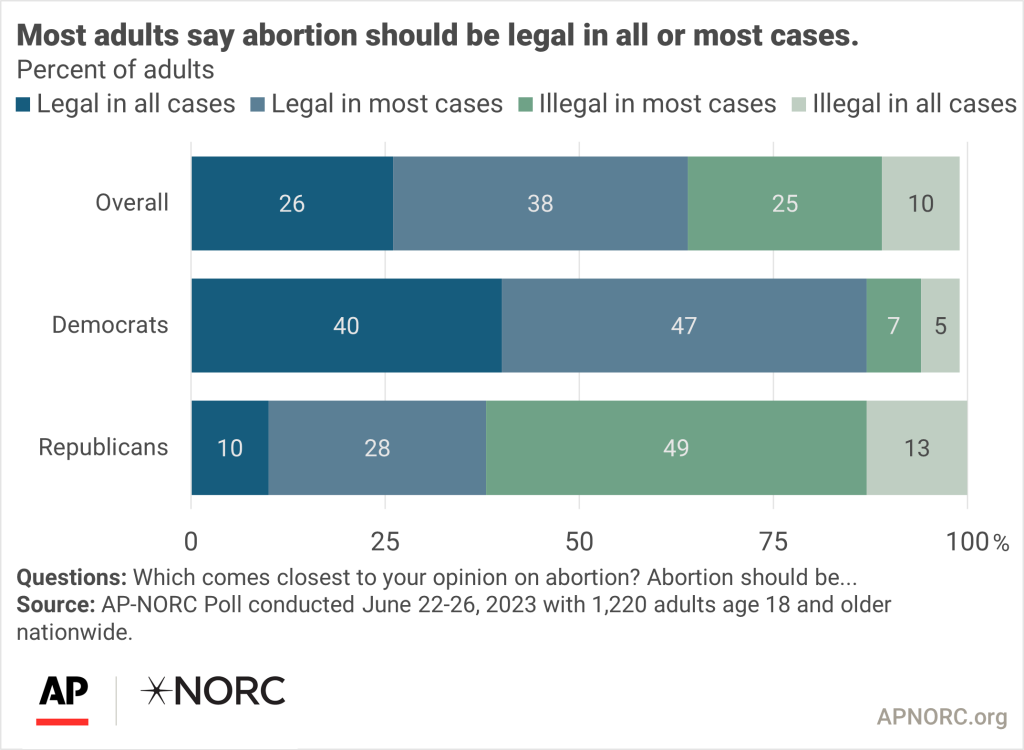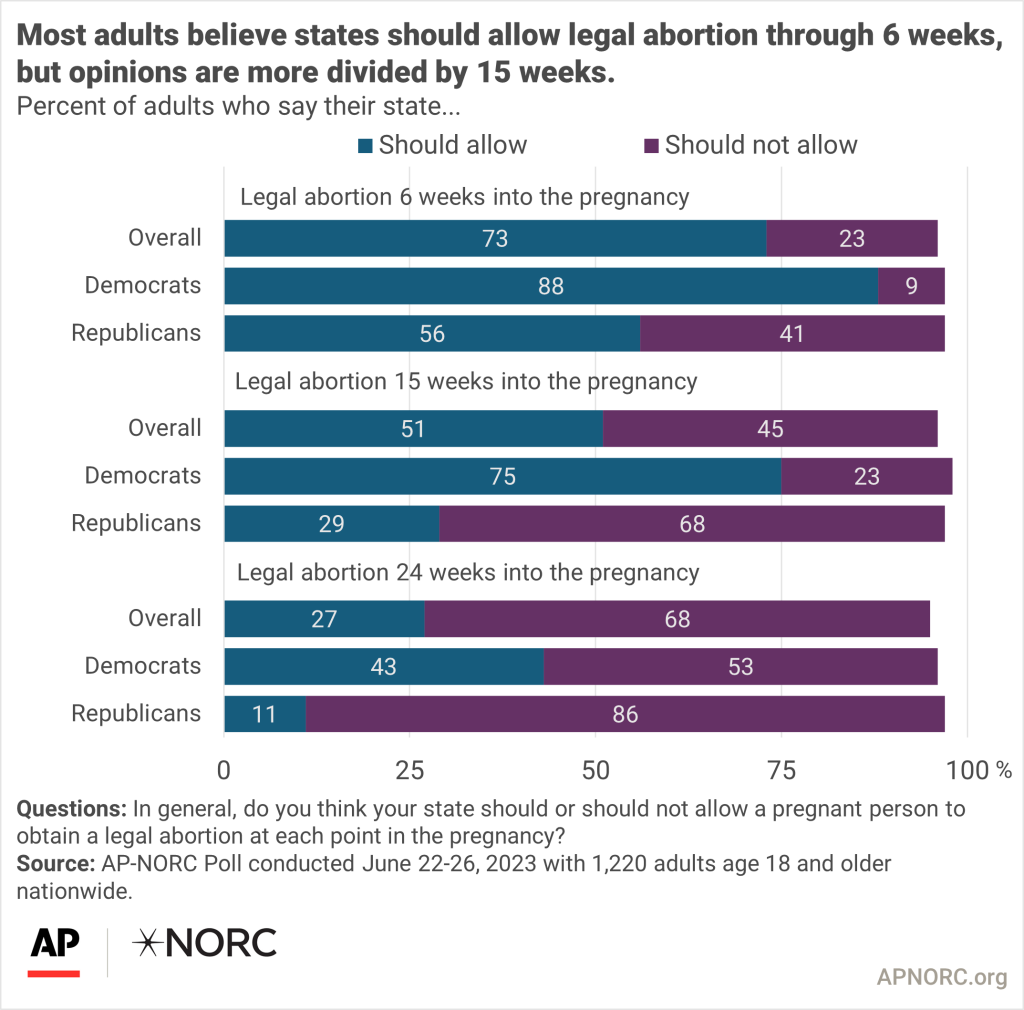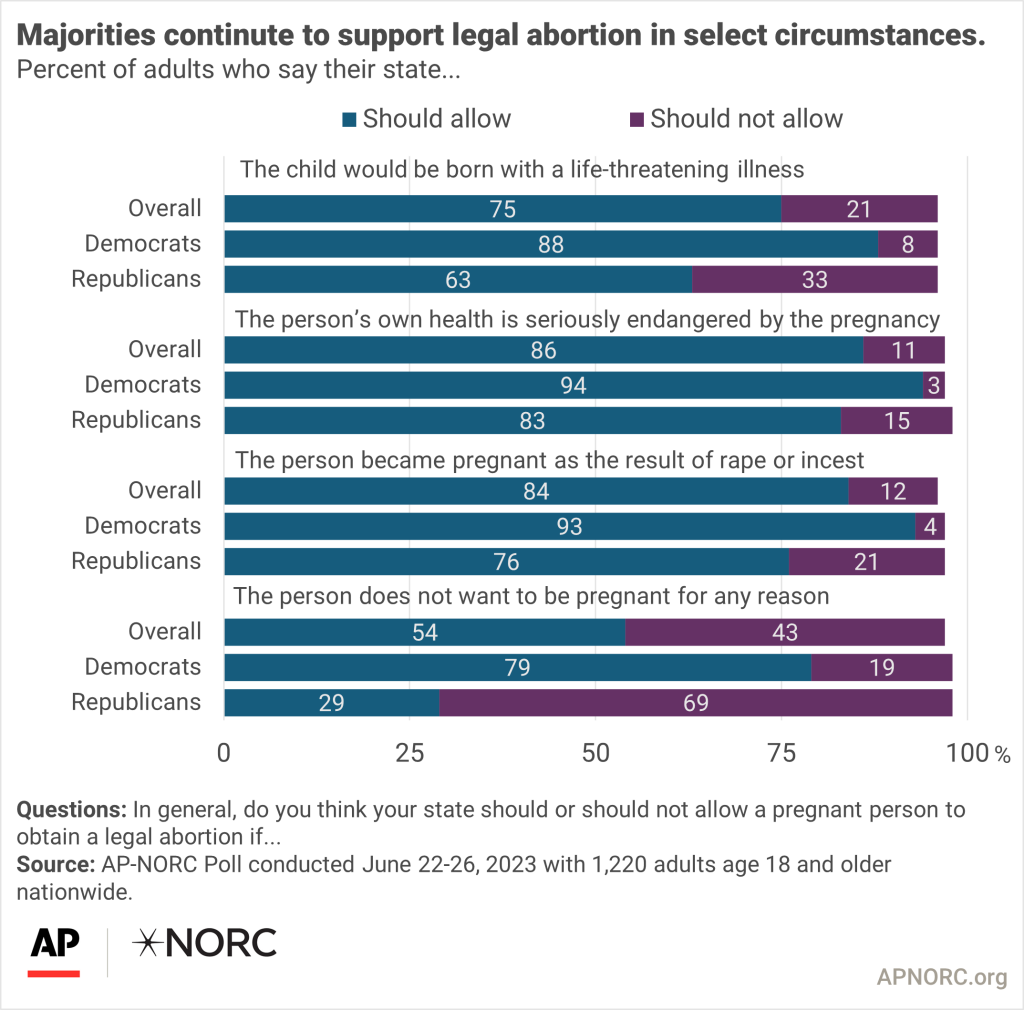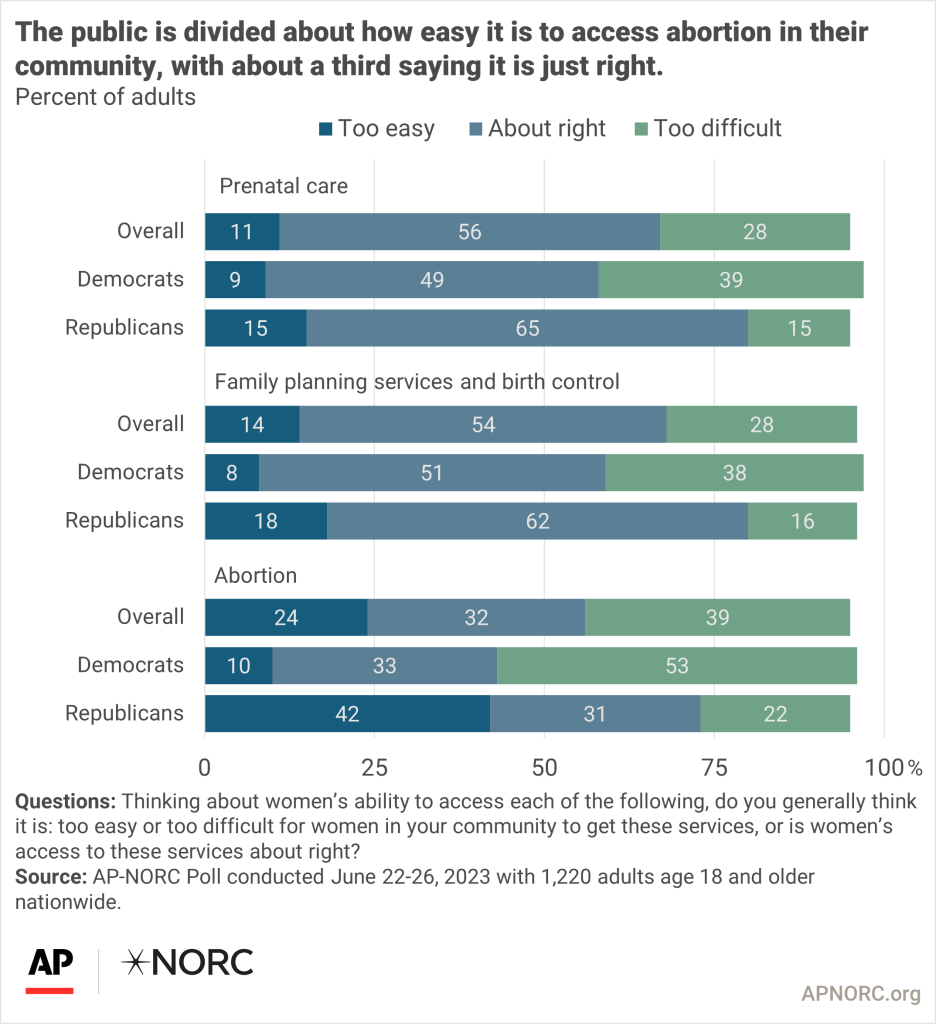
July, 12, 2023
A year after the Supreme Court overturned Roe v. Wade, most adults still believe that abortion should be legal in all or most cases, and most are in favor of Congress passing a law guaranteeing access to legal abortion. This is similar to the results of an AP-NORC poll conducted July 2022 when Roe v. Wade was first overturned.
Opinions are more divided over the timeframe of when abortion should be allowed. Seventy-three percent of respondents think that it should be allowed within the first 6 weeks, but that drops to 51% for 15 weeks. Most people living in states where abortion is highly restricted say it should be legal at least up to six weeks, even as they generally favor tighter access to abortion than adults overall.
Most adults believe that abortion should be legal in all or most cases, consistent with a July 2022 poll. And 60% of the public think Congress should pass a law guaranteeing access to legal abortion nationwide. However, a partisan divide persists. Most Democrats say abortion should be legal in all or most cases, while most Republicans think it should be illegal in most or all cases. Similarly, 84% of Democrats support a federal law ensuring access to the procedure, compared to just 32% of Republicans.
Democrats are more supportive of legal abortion than Republicans regardless of religion. Among Catholics, 85% of Democrats believe that abortion should be legal in all or most cases compared to 39% of Republicans.
People living in states with the most restrictive abortion laws are less likely than those living in states where abortion is broadly available to say abortion should usually be legal, 53% vs 70%. Still, even in those most restrictive states, only 14% say abortion should always be illegal.

And while most people believe that their state should allow legal abortion 6 weeks into pregnancy, opinions are more divided later into pregnancy. About half of adults say states should allow legal abortions at 15 weeks, and just 27% say the same at 24 weeks into a pregnancy.
Fifty-eight percent of those living in states with the most restrictive abortion laws people say abortion should be allowed at six weeks along with more than 7 in 10 people in the rest of the country. At 15 weeks, 59% of those living in the least restrictive states say it should be legal compared with about 4 in 10 people in more restrictive states. Only 31% of people living in states where abortion is broadly available say the procedure should be legal at 24 weeks as well as about one in four residents of states with at least some restrictions.

Majorities of both Democrats and Republicans believe that a pregnant person should be allowed to obtain a legal abortion in certain circumstances, including if the child would be born with a life-threatening illness, the pregnant person’s own health is seriously endangered by the pregnancy, or the person became pregnant as the result of rape or incest.
And majorities of born-again Christians and Catholics agree that a pregnant person should be allowed to obtain a legal abortion if the pregnant person’s own health is seriously endangered by the pregnancy or if the person became pregnant as the result of rape or incest.
But if a person does not want to be pregnant for any reason, just 29% of Republicans believe they should be allowed to obtain a legal abortion compared to 79% Democrats.
These opinions have remained relatively consistent since AP-NORC last asked these questions in July 2022.

Most adults know someone who has had an abortion, including 63% of Democrats and 53% of Republicans. Despite the overturning of Roe v. Wade, few Americans know someone who has been unable to get an abortion (7%) or who had to travel to another state to do so (7%) in the last year.
The public is divided about how easy it is to access abortion in their community. Thirty-nine percent think it is too difficult, 24% think it is too easy, and 32% think it is about right. About half of adults say access is about right when it comes to family planning services and birth control and prenatal care, while 28% say it is too difficult to access these services.
People living in states with highly restrictive abortion policies are somewhat more likely to say it’s too difficult than people in states where abortion is broadly available, 44% to 36%, even though people in these states generally favor more restrictions on abortion.

Overall, 39% of adults approve of how President Biden is handling abortion policy, including 61% of Democrats and just 18% of Republicans.
States where most abortions are illegal at all stages of pregnancy with few exceptions include Alabama, Arkansas, Idaho, Kentucky, Louisiana, Mississippi, Missouri, North Dakota, Oklahoma, South Dakota, Tennessee, Texas, West Virginia, and Wisconsin.
Abortion is illegal after about six to 20 weeks of pregnancy in Arizona, Florida, Georgia, Nebraska, North Carolina, South Carolina, and Utah.
And states where abortion is legal at least until 22 weeks include Alaska, California, Colorado, Connecticut, Delaware, District of Columbia, Hawaii, Illinois, Indiana, Iowa, Kansas, Maine, Maryland, Massachusetts, Michigan, Minnesota, Montana, Nevada, New Hampshire, New Jersey, New Mexico, New York, Ohio, Oregon, Pennsylvania, Rhode Island, Vermont, Virginia, Washington, and Wyoming.
The nationwide poll was conducted June 22-26, 2023 using the AmeriSpeak® Panel, the probability-based panel of NORC at the University of Chicago. Online and telephone interviews using landlines and cell phones were conducted with 1,220 adults. The margin of sampling error is +/- 3.9 percentage points.
- Citation: AP-NORC Center for Public Affairs Research. (June 2023). “Most Americans support legal abortion with some restrictions.” https://apnorc.org/projects/most-americans-support-legal-abortion-with-some-restrictions-AP-NORC/







